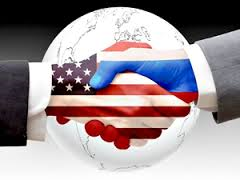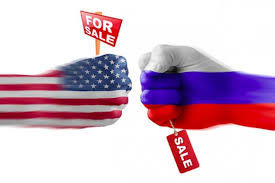 
 字體:小 中 大
字體:小 中 大 |
|
|
|
| 2017/04/12 11:16:38瀏覽496|回應2|推薦2 | |
Political analyst, assistant professor at the Department of World Politics of the Moscow State University named after Lomonosov, Alexei Fenenko, analyses the latest history of Russian-American relations, debunks myths and says what to expect from the new US administration."How has the election of Donald Trump affected the Russian-American relations?""I believe that we in Russia personify the Russian-American relations too much and exaggerate the degree of their dependence on internal elections. Modern states are gigantic bureaucratic systems that give any policy-maker a "corridor of opportunities." There are objective strategic interests of the state, including its status in world order, and the system of relations with other states. It is hardly possible for any politician to radically break those interests. We can talk a lot about the difference between Trump, Clinton or Obama. At the same time, we all understand that none of them will dissolve NATO, eliminate the American presence abroad, curtail the global free trade regime and welcome the idea of the reintegration of the former USSR. This requires a global shock, a massive disaster, but as long as there is nothing like this happening, it is the system that determines their policy. - 美國與蘇聯這2個超級大國,自從上一世紀第二次世界大戰以後,就否定對方,相互對抗至今,筆者友人最近發表新論,描述美國與蘇聯關係,似乎無解,由於翻譯版權尚在接洽中,故以原文刊登敬請參考.最近美,蘇2國又為敘利亞及IS問題大打出手,只不過是境外戰爭,下一回合可能就是以北韓問題,引爆新的時局,咱們視目以待,聽說蘇聯遠東太平洋艦隊,已啟航駛向韓國海域要與美國卡爾文森號航空母艦戰鬥群互不侵犯? 互不相讓? 互別瞄頭,其結果看起來又是南韓與北韓老百姓遭殃,套句中國成語城門失火秧及池漁? 至於此番中國是否能夠置身事外,誰也無法掌握,瞬息萬變的時局,搞不好美國真的發動戰爭,重啟韓戰,攻擊北韓,那麼還會有中國人民解放軍志願,赴湯蹈火參戰嗎? 現在的解放軍依舊會高唱中国人民志愿军战歌 Chinese People's Volunteers Battle Song 入韓作戰?
"Modern leaders come either from bureaucracy or big business. In a nutshell, they are system-oriented politicians who are used to playing by the rules of the game from their early years. They play by the rules, but they do not establish their own rules. It's no surprise that we have seen no dramatic changes during the first two months of Donald Trump's stay in power. He could have a loose tongue before the election, but the system subsequently put everything in place after he took office. "Interestingly, Russia has been developing its relations with all recent US presidents on the basis of one and the same scenario. At first, we say: it can't be worse than during the presidency of Clinton, Bush, Obama. Then we say: now there's pragmatic Bush, Obama, Trump in the White House, and he is going to start a dialogue with Russia. Then we proceed with saying the following: he is not a bad president, but there are too many obstacles on his way - Congress, the Pentagon, diasporas. The grand finale is the same as the start: this is the worst administration ever! Predictably, in 2020, we will all be expecting a "Democratic pragmatic" candidate to take Trump's place." "What stage of development or degradation of US-Russian relations are we going through now?" "It is objective factors that play the key role in the US-Russian relations. There are three key phases in their development. 
"The first phase was in 1994, when the Bill Clinton administration assumed that the Russian-American relations had not reached a new quality that would make them different from Soviet-American relations. Technically, Russia has remained the only country in the world that could wage war against the USA and destroy the country. Russia's military complex is the only military complex in the world that can compete with that of the USA. Russia also has a spectrum of fundamental sciences. Russia inherited the status of a permanent member of the UN Security Council - a possibility to diplomatically block US actions. In this capacity, Russia objectively remains an obstacle to American leadership in the world regardless of who takes the Kremlin - Yeltsin, Putin or anyone else. "Consequently, the US-Russian relations are based on the fundamental principle of mutual nuclear deterrence, as US Secretary of Defence William Perry said in January 1995. We still hold each other's major cities and military facilities hostage. One can say a thousand times that we are partners, but everyone understands very well that partners do not hold nuclear pistols to their heads. "At the turn of 1994-1995, the Clinton administration outlined four strategic goals in relation to Russia: a) maximum reduction of the Russian military-industrial complex, the nuclear industry in the first place; b) prevention of the reintegration of the former USSR; c) consolidation of the results of the collapse of the "socialist commonwealth"; d) decentralization of the Russian fuel and energy complex. Of course, the Americans preferred to deal with the "liberal" segment of the Russian elite, presenting their strategy as "quasi-partnership" with Russia. Yet, USA strategic goals for Russia remained unchanged always. The second phase is 1997, when Russia and China signed the Declaration of the multipolar world. In fact, the two countries declared their intention to create a different world order - an alternative to the concept of US leadership proclaimed in 1993. The USA saw the creation of a new political alliance, which announced its intention to restrict the supremacist policy of the USA. At the same time, a new task had emerged for American diplomacy: to split the alliance of Moscow and Beijing or at least not to allow Russia and China's alliance to strengthen. We often say that after the end of the cold war, international relations were "deideologized." This is not true to fact. On the contrary, since the mid-1990s, we have been able to observe the development of a new, even sharper, ideological clash of two world order projects. It goes about the US world order, based on the concept of the unipolar world and the Russian-Chinese model of multipolarity. Russia and China started attracting India, Latin America and a number of EU countries (France and Germany) to their side. The world, in fact, has split ideologically into those who either support or reject US supremacy. "The third phase is Vladimir Putin's Munich speech in 2007. The speech sent a very important message to the USA. Russia announced an opportunity to counteract the US model of the world order. The Americans could see that Russia was working against their leadership. The elites of the two countries had realised by that time that it was impossible to develop a positive agenda for the Russian-American dialogue. The joint struggle against terrorism broke up because of the US-led invasion of Iraq and the establishment of US military presence in Central Asia. The joint struggle against the non-proliferation of nuclear weapons collapsed during the crises around the nuclear programs of Iran and the DPRK. "The idea of partnership in the field of energy died when Russia wanted to revise the concept of "energy security" at a G8 summit. Mind you that the idea to expel Russia from the G8 appeared in Washington not during the crisis around the Crimea, but on the eve of the St. Petersburg summit of 2006, when both chambers of US Congress adopted similar recommendatory resolutions.
"The strategic dialogue on arms control is in crisis too because of disagreements on missile defence. Therefore, the Americans start opposing not only Russia per se, but also Russian policies. The policy of "reset of relations" in 2009-2011 was an attempt of the Americans to see on which grounds Russia was ready to cut its nuclear potential. As soon as Washington realised that there were no such grounds whatsoever, they curtailed this policy before Putin returned as president. After the unrest in Moscow in the winter of 2012, the Obama administration saw a window of opportunity to put pressure on the "weaker Putin." "In the spring of 2012, the White House initiated the curtailment of the strategic dialogue on missile defence, rejected the dialogue on European security reform and introduced restrictive anti-Russian sanctions. The process began long before the Crimea and the Magnitsky law. They tried to disrupt the Eurasian Union project and eventually triggered the Ukrainian crisis. The world found itself on the brink of a hot war, and world leaders acknowledged that last autumn. "The first two months of the Trump administration have demonstrated that there is no principled willingness of the United States of America to turn to Russia. The Trump administration is not ready for a "big deal" with Russia. Time goes by, but all problems remain frozen."
- |
|
| ( 時事評論|國際 ) |

















